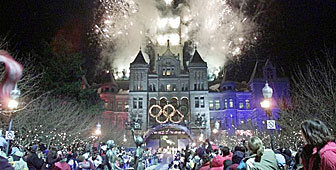Showtime in Salt Lake

The Salt Lake City Winter Olympics are set to be the biggest yet, involving more nations, more medals, more money - and the largest ever team from Switzerland.
With 114 athletes competing in 13 of the 15 sporting disciplines, the Swiss delegation is half as big again as the 74-strong squad that travelled to the Nagano Games of 1998.
The national ice hockey team’s qualification for the Salt Lake Games has been a major factor in the growth of the overall Swiss squad, with hockey coach Ralph Krueger calling up 23 players for the team’s first Olympics in ten years.
The Swiss Olympic Association says it wants to see its athletes match the seven-medal tally from Nagano. Given the size of the squad and the addition of ten new Olympic events, though, many Swiss sports fans will be hoping to see their heroes make it into double figures.
But while the Swiss may be going big on these Olympics, the Salt City organisers are going massive.
Seriously big bucks
Almost $2 billion (SFr 3.4 billion) have been lavished on the Salt Lake Games, nearly double the amount spent four years ago in Nagano. While it has become traditional for each Olympic city to try and outdo its predecessor, the cost of this year’s Winter Games has also been inflated by security needs and the rising number of athletes.
Following the September 11 terrorist attacks on the United States, a security plan costing around $300 million (SFr512 million) has been implemented for the Games. Up to 7,000 federal agents and 5,000 National Guard troops are being used to turn these Olympics into what organisers are calling “the most secure event on the planet”.
“We have the best security plan that mankind can develop for this kind of event,” Utah governor Mike Leavitt told a recent media conference. “We have no choice – we have to make the Games as safe as humanly possible.”
Despite the high costs, the Salt Lake organisers are predicting a profitable Games. Thanks to brisk ticket sales and the acquisition of more than $1 billion in television and sponsorship revenues, this year’s Olympics are expected to leave the state of Utah with a balance of around $40 million.
From sleaze to skis
As well as hosting a financially healthy Games, the Salt Lake organising committee will also be keen to enhance their own image following the corruption scandal that rocked the International Olympic Committee (IOC) three years ago.
In December 1998, Salt Lake City saw its reputation tarnished when Swiss IOC member Marc Hodler accused the Games’ organisers of using bribes to help their Olympic bid. An investigating committee later backed up Hodler’s claims, leading to the expulsion of six IOC members and the resignation of another four.
With strict regulations now in place to cover the bidding process, the IOC and its new president Jacques Rogge are hoping to consign the scandal to the history books. A successful 17 days of sport in Salt Lake City would go a long way towards fulfilling that hope.
by Mark Ledsom with agencies

In compliance with the JTI standards
More: SWI swissinfo.ch certified by the Journalism Trust Initiative
You can find an overview of ongoing debates with our journalists here. Please join us!
If you want to start a conversation about a topic raised in this article or want to report factual errors, email us at english@swissinfo.ch.